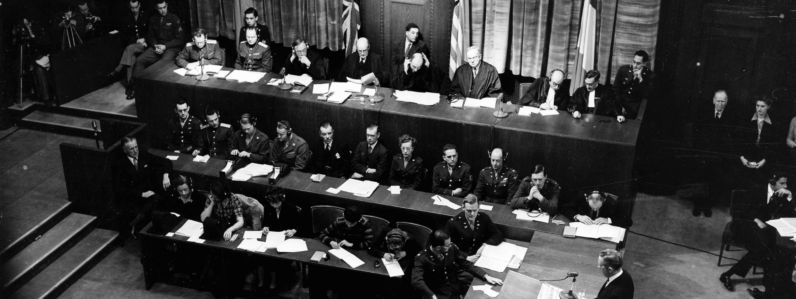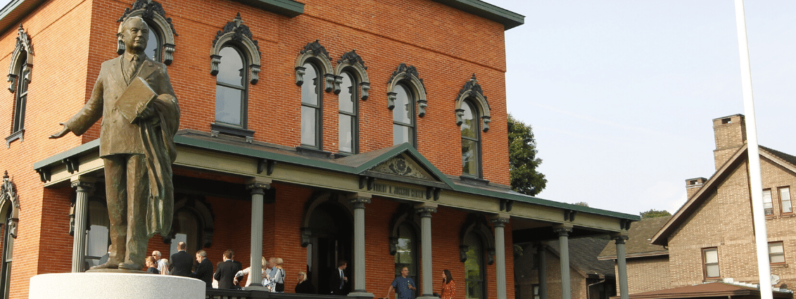Mr. Jackson’s talk to the senior law student of Georgetown University. November 25, 1954.
I am certainly glad to talk here and to be of such help as I may, if any, to a group of young men who are preparing to take places in the legal profession, a profession which I think offers more opportunity for pioneering and independent thought today than almost any profession to which you might seek admission.
I am going to talk to you about taxation in a rather informal way and quite apart from trying to instruct you. You have had an instructor form our office, and I am sure there is nothing wanting by way of instruction. I would like, if possible, to give you a view of taxation as it relates, not only to the law, but as it relates to government and to life as we live it in this generation. The principles and of the body of tax law have been pretty thoroughly explained to you, and what I am going to talk about is the spirit of the thing. The rated, procedures, etc., I assume you know, and I might be a poor person to instruct you because, to tell the truth, I am not so much interested in rates and the exact amount of revenue they produce as I am in the effect that taxes and any particular tax produce upon the lives of people because that is the purpose that we have government for. The philosophy of taxation has not been too well explored by the general body of practical lawyers. A great many lawyers, when the income statute was first enacted, said, “This is a think for accountants, this is not a field for a lawyer”. And so they abandoned the field. We find a great many members of the bar who take the position that taxation, after all, is a matter of figures with which they are not concerned, and the thing that I want to impress on you this morning is that it is a matter of figures but it affects the lives of the people, and that there is a philosophy of taxation which underlies all of these revenue measures, a philosophy on which men differ. A philosophy which as applied to taxation matters really bespeaks their whole philosophy of life, and if I stir you up to debate about it that will be an accomplishment in itself. I do not want you to be mere technicians. If you are going to be mechanics, get a job in a garage. There is no place for you in the bar. Men in the bar who merely see their work in the light of the immediate results have failed in the whole spirit of their profession and this is particularly true in connection with tax matters. The matter of taxation calls for designers, not for mere mechanics. Taxation is very much more than a mere subject in law. Of course, tax law is a branch of law which calls upon every department of the law for a contribution but it is also the science of government, because no government could exist if it didn’t have taxation under our modern theory, and the manner in which the government goes about its work and the work that it will do for its citizens depend very largely upon its ability to finance its program by taxation.
Every time that a tax is imposed, it reaches into the economic streams of the country and pulls out certain amounts of revenue. Many of the laws which are enacted over on the Hill never affect more than a few people. A tax law inevitably affects every fireside in the United States, directly or indirectly. I suppose that a tax on tobacco would affect every family in the United States, directly or indirectly a small amount perhaps but it has its effect on the family income. Income tax affects many people who never fill out an income tax return, and it is in the bearing that they have on life itself that the tax laws of the country become so important. Somebody, whenever a tax is paid, has to give up something else, and the manner in which a tax law is framed may have a dominating effect in encouraging the concentration of wealth in a few hands. It may burden people according to their strength, or tax people according to their ability to pay, or it may be a burden that must be borne by a man regardless of his income and regardless of his ability to pay, and it is mainly upon the question of whether people shall be taxed on their ability to pay, and it is mainly upon the question of whether people shall be taxed on their ability to pay that the debates on revenue center. Taxes have direct bearing upon nationalism itself. It hasn’t been so long that we have been dependent upon taxes for the operation of the Government. In the Middles ages, the sovereign parceled out lands upon a basis of rentals so that he had his own revenue. If you are interested in the way the change cause about you will find in B—“Life of Richlien” a very interesting story of the way in which the continental Europe founded a system of state revenue which supported the King’s army and enable them to found the modern state. There is certainly ground for controversy as to whether at least some of the developments of this kind of taxes are the base of modern capitalism. We can’t have the modern estate fashioned along the lines that we Americans use in our conventional thinking without a comprehensive scheme of taxation because we find in our modern scheme of things that the state must not have revenues of its own. Of course there is some debate about that in the last few years, but the prevailing through is that if it were an enterprise that yielded a profit, that enterprise must be left to individual exploration and that the Government must confine itself to activities which do not pay. If we had a connecting system of wires between two cities over which we talked, that must be owned by private enterprises because it produces a return, but if we had a telephone system operated at cost, connection the two cities, that could be left to the Government. Thus our system of economics deprives the Government of the capacity to operate its own profitable enterprises and have its own revenue. The result is that taxes are indispensable. A great many people question that theory. It is being questioned in high places. It is likely not to survive, but at least up to the present time we have kept the Government in the unprofitable things and made it come to the tax payer for all its revenue.
The Government is somewhat to blame for it perhaps because the Government doesn’t set itself up on the same basis as individuals. For example if you were to take a statement of the American Tel. and Tel. you would find that it showed on one side some debts and that it had borrowed some money, but on the other side you would find buildings listed as assets. The Government does list the post offices and other buildings it owns. The Government strangely enough shows no assets, although every building and every highway would come under that category. Most of the things that the Government goes into that produce assets are part of our national wealth. If all of you men have a dollar apiece and each spends it in his own way, it is strictly anarchistic. Every man goes his own way. If you put it into a common fund, it becomes a planned economy. You devise a plan by which you spend it. The dollar that is spent in private business is spend according to the whim of its owner. It may be spent wisely or wastefully; no one knows how it may be spent. It is spent without without plan, and it is spent oftentimes without result. The moment that it is spent for taxes it is spent according to plan. It may not be a wise plan, but at least it is taken out of private business, and it has only been by taking a certain part of the production of the country and putting it into the things that are for our common benefit that we have the great system of public enterprise which we have in this country. So I want to impress upon you that the gathering of taxes by the Government is not a destruction of wealth, but it is really the taking of an unplanned dollar and putting it into a plan. And the wisdom of the taxation depends on the wisdom of the plan. Accordingly, people should take an interest in it and see that it is wisely spent. Taxation has lately aroused the interest of people because they begin to see how far taxation can be used as an instrument of social control. To give you a couple of example of the way it can be used: There is a problem about machine guns in the country, and it is the desire on the part of the national Government to control crime and criminals more effectively, and so they exacted a taxing statute by which they impose a tax on the machine fun and require every transfer to be registered and every transfer to be taxed. The purpose is not to raise revenue, but to know where every machine gun is and who owns it. Another example of the use of taxation for control purposes entirely apart from revenue purposes: You have probably head or perhaps had some experience with an experiment known as prohibition. Some of the estates enforced a local prohibition law after repeal and some did not. And so there was enactment placed in the national statute that any person who sold intoxicating liquors in violation of the law of his state should pay a special fine of a tax of a thousand dollars to the Bureau of Internal revenue. In those states which still have prohibition laws and also are selling intoxicating liquors, it is expected that the agents of the government go in and collect a thousand dollars apiece from those violating the state law. The purpose is not revenue, but primarily to penalize the breaking of a state law and to lend Federal aid to local enforcement. There may be some question about the nation enforcing a law that the state wants enforced, but that shows you how far taxation can be used to accomplish results apart from revenue raising Taxation is also used to accomplish a concentration of wealth in the hands of relatively few people. It isn’t a matter of soap box oratory. For many years it was the deliberate policy of the national Government to use a protective tariff for taking out of the people at large small amounts of money and dividing them to the so-called protective tariffs for the purpose of building up the industry of the country. That was our policy. But I am not discussing the policy, I am simply pointing out to you the use that can be made of this policy of taxation and something of the spirit of it apart from its mechanics. Lately there has been a deliberate effort to use taxes to undue that concentration of wealth and to enforce a redistribution. The graduated income tax was one of the examples of that method. An inheritance tax which is stepped up to tax larger fortunes, the stepping up of estate tax rates so as to make almost prohibitive inheritance of vast estates are other projects of the kind. The latter is one of the common conflicts in taxation of the future, one of the arguments that is going to be waged this coming winter between those who want to use taxation to prevent concentration of wealth and perhaps force its distribution to some extent and those who want to use taxation as a means of collecting revenue irrespective of their ability to pay. There will be conflicts between the sales tax and the income tax and estate tax and gift tax, the sales tax being a tax which it is contended is born by the people at large. The man with a large family is, of course, a purchaser of commodities to a greater extent in proportion to his income than a rich man with a small family. A sales tax is really a tax upon the mess of the people and an income tax is a tax upon the mass of the wealth of the country, and the question is shall the people be taxes or the wealth be taxes. I think these figures bear upon the question of the policy the country should pursue, and you will be interested, as debates on taxation progress, to have the background upon which they will be built.
Some people, at least I suppose new dealers, will try to reach a different objective in taxation than this country for many years has had. If you haven’t read it, you will be interested in the book by B—and --- on Modern Corporations and private property. You will find there the story of the immense concentration of wealth during the period when income tax was not existent. You will find the story of the use of taxes for the concentration of wealth. It isn’t written form the tax point of view, but you can supply the missing points on taxation. By 1929, 200 corporations, not including any banks, owned 22% of the national wealth of the United States, and from 1919 to 1929, during the ___ period, in spite of the tax measures they had increased 85% of their holding of the national wealth of the country. Control of that wealth had concentrated even faster than the wealth itself, because by the device of holding companies the control of vast amounts of wealth was often lodged in the hands of a very small amount of the voting stock. One of the great causes of our difficulties in this depression has been the over-production of stock certificates. The following are some facts as to income in the United States which were recently made public by the Brookings Institution, taking the family as a unit of income. Because that is the way we spend. If one boy in the family spends for himself, some other member of the family may have to five up something. The family income is mainly a pool for family purposes. In 1929, the great year of American prosperity, there were six million families in the United States, of 21% of all the families who had less than $1,000 of annual income; 12 million families, or 42% of all families had annual incomes of less than $1,500; and 20 million families or 71% of all families had under $2,500 of annual income, and there were only 600,000 families in the United States whose combined incomes for the family were over $10,000 in 1929. One-tenth of one percent of the families in the Unites States at the top of the economic scale had as much of the national income as 42% of the families at the bottom. 30,000 families had as much as 12 million families. That is the basis upon which we must consider new plans of taxation; that is the bases upon which we must work when we devise a tax law- to see where the revenue is coming. It is apparent that if you put a tax upon an article of consumption, those 20 million families with incomes under $2,500 are the consumers and it is perfectly apparent that if you put a tax upon incomes and you hit the incomes about $10,000 pretty hard you are hitting a relative small group of people with a relatively large income. That is why taxation is coming to assume such vital importance in this country. To me a tax law which reaches down into the group of people who spend their entire incomes for existence merely reduces their purchasing power and reduces the number of things they may have in their daily lives.
The field of taxation is a very tempting one in which to let your imaginations run wild. Great things can be accomplished in this country by taxation. Great things have been accomplished by taxation. If anybody thinks that the scheme of concentrated wealth through customs taxes was not carefully planned, they should read the debate in Congress over the tariff. We have always had a planned economy. It depended a little on who planned it what it was planned for. So it is time that the plans were made with a little greater emphases upon the general welfare. And so I am hoping that you will not regard taxation as a mere matter of balance sheets or a mere matter of figures. It is a fundamental matter in the life of this country. In a democratic country it is perhaps one of the ways within our constitution by which the mass of the people may protect themselves against the concentration of wealth.
I want to say that the things I have said to you are more of less long distance matters. I am not endeavoring to either defend the social policy of the Government nor am I trying to foreshadow what may be done in the immediate future by way of legislation. I am trying to point out to you that in branch of law which you have studied is there such an unexplored frontier which you may press into an in which new patterns of thought are possible as in this field of taxation. I am far from an expert on the subject. I have merely given you a general view point, but if, in the remaining time we have, there are any subjects that you are particularly interested in, I would be glad to discuss them with you.






